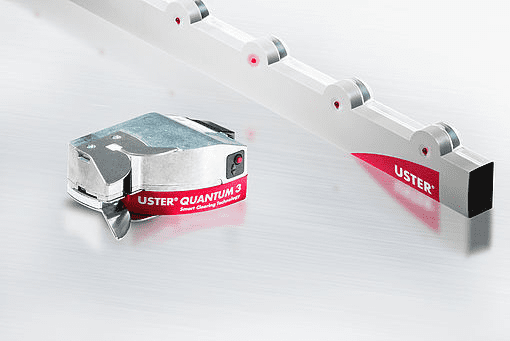- Quality Management: Quality Management Platform and Value Modules
- Laboratory Systems: New features for USTER® TESTER 6
- Fabric Inspection: USTER® Q-BAR 2 and FABRIQ EXPERT
USTER launches five value modules for the Quality Management Platform at ITMA
Visitors to ITMA 2019 will see the present and future of textile quality management. A world in which substandard quality is actually prevented – instead of just being monitored and removed.
This new reality for mills enables data-based preventive control. It is delivered exclusively by Uster Technologies through USTER® QUALITY EXPERT, the ultimate Quality Management Platform. The system connects, integrates, analyses and interprets vital quality information from every stage of the fiber-to-yarn process. This analysis is based on USTER® application know-how and produces alerts about exceptions and suggestions for fixing them, as well as improvements when necessary.
At ITMA, five ‘Value Modules’ for USTER® QUALITY EXPERT will be launched, after successful testing by customers around the globe. These modules will give spinners an objective and accurate view of the entire spinning process, leading to higher yields and consistent quality: ‘Managing a textile mill with quality in mind’ in practice.
Optimize ring spinning, control contamination – and much more
The five Value Modules will give tangible benefits to operators, quality managers and mill managers.
Ring Spinning Optimization (RSO)
RSO focuses on the most costly part of yarn making – ring spinning – using data from USTER® QUANTUM 3 yarn clearers at winding and USTER® SENTINEL in ring spinning to ensure yarn quality stays constant, even at high speeds. Spinners can correlate end-breaks with winding data, as well as with fiber properties, in a single system. This results in an improved cop build-up quality, fewer quality variations and a reduction in alarms, delivering significant profitability increases to yarn producers.
USTER® RSO 3D extends this functionality to quality mapping of the ring frame, based on individual quality data for each spindle. This helps to identify outlier sides, sections or spindles. Through seamless collaboration with Muratec QPRO EX/FPRO EX spindle identification, USTER® QUANTUM 3 and USTER® SENTINEL, the system can stop faulty spindles or poor quality cops and so prevent poor quality. This reduces the workload for operators, while increasing quality assurance.
Total Contamination Control (TCC)
The double protection by USTER® JOSSI VISION SHIELD and USTER® QUANTUM 3 gives spinners control over balancing quality and productivity – a transparency that enhances cost efficiency and maximizes profits. It means they can make good choices about raw cotton purchases and reduce waste of ‘good’ fiber. Optimizing ejections and cuts gives precise control over levels of contamination, ensuring the yarn meets customer demands.
Alarm center
This provides direct guidance to machine operators, alerting the appropriate personnel and pointing them to the exact location of an issue. Knowledge from these alarms is stored and used for future reference, enabling even faster reactions.
Mill analysis
Intelligent, data-based analysis by USTER® QUALITY EXPERT provides customers with an excellent overview of mill operations. Information is stored centrally, for easy access and total transparency. The result is savings in both time and money.
Yarn prognosis
Accurate forecasting of how yarns will perform in downstream processes brings security and confidence to both spinners and their customers. It means spinning mills can isolate below-par quality and remove it, sending out only yarn which meets customer specifications.
Quality Management Platform for long-term business success
By increasing productivity, the Quality Management Platform contributes directly to improved business security for textile producers. “The profitability and future sustainability of a textile mill depends a lot on the optimization of production and the predictability of produced quality,” says Thomas Nasiou, CEO of Uster Technologies. “Our customers are partners and we want to support them to stay successful and tackle challenges, by providing the best services and systems.”

